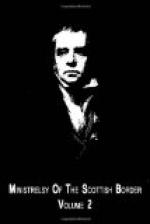The insurrection, commemorated and magnified in the following ballad, as indeed it has been in some histories, was, in itself, no very important affair. It began in Dumfries-shire where Sir James Turner, a soldier of fortune, was employed to levy the arbitrary fines imposed for not attending the episcopal churches. The people rose, seized his person, disarmed his soldiers, and having continued together, resolved to march towards Edinburgh, expecting to be joined by their friends in that quarter. In this they were disappointed; and, being now diminished to half their numbers, they drew up on the Pentland Hills, at a place called Rullien Green. They were commanded by one Wallace; and here they awaited the approach of General Dalziel, of Binns; who, having marched to Calder, to meet them on the Lanark road, and finding, that, by passing through Collington, they had got to the other side of the hills, cut through the mountains, and approached them. Wallace shewed both spirit and judgment: he drew his men up in a very strong situation, and withstood two charges of Dalziel’s cavalry; but, upon the third shock, the insurgents were broken, and utterly dispersed. There was very little slaughter, as the cavalry of Dalziel were chiefly gentlemen, who pitied their oppressed and misguided countrymen. There were about fifty killed, and as many made prisoners. The battle was fought on the 28th November, 1666; a day still observed by the scattered remnant of the Cameronian sect, who regularly hear a field-preaching upon the field of battle.
I am obliged for a copy of the ballad to Mr Livingston of Airds, who took it down from the recitation of an old woman residing on his estate.
The gallant Grahams, mentioned in the text, are Graham of Claverhouse’s horse.
THE BATTLE OF PENTLAND HILLS.
This Ballad is copied verbatim from the Old Woman’s recitation.
The gallant Grahams cum from the west,
Wi’ their horses black as ony craw;
The Lothian lads they marched fast,
To be at the Rhyns o’ Gallowa.
Betwixt Dumfries town and Argyle,
The lads they marched mony a mile;
Souters and taylors unto them drew,
Their covenants for to renew.
The whigs, they, wi’ their merry
cracks,
Gard the poor pedlars lay down their packs;
But aye sinsyne they do repent
The renewing o’ their covenant.




